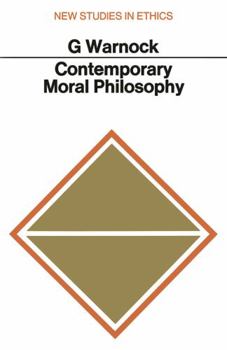Contemporary Moral Philosophy
(Part of the New Studies in Ethics Series)
No Synopsis Available.
Format:Paperback
Language:English
ISBN:0333048970
ISBN13:9780333048979
Release Date:June 1967
Publisher:Palgrave
Length:92 Pages
Weight:0.34 lbs.
Dimensions:0.2" x 5.5" x 8.5"
Customer Reviews
1 rating
Concise Introduction to Early Twentieth-Century Meta-Ethics
Published by Thriftbooks.com User , 20 years ago
Looking to quickly survey the history of early twentieth-century meta-ethics in the English-speaking world? Then this is the book for you. If you've got about two hours, you can introduce yourself to intuitionism, emotivism, prescriptivism, and some worries about all of them. If you're too lazy to do that much work, I'll give you sketch of the story in the next few paragraphs.Our story begins, as do nearly all stories about meta-ethics in this period, with G. E. Moore and his Principia Ethica. Moore's Principia defends of a particularly puzzling and problematic form of moral realism, non-naturalist intuitionism, and includes his famous Open Question Argument. In Warnock's presentation, what is important about Moore's book is the nature of his conclusions and not the details of his arguments. Of particular importance is the fact that Moore's position commits him to not having a great deal of positive and substantive things to say about the fundamental questions of ethics. Moore's distinctive meta-ethical conclusions are the following: that certain basic ethical terms cannot be defined (at least by non-moral terms); that ethical properties aren't natural; and that ethical knowledge isn't based on anything other than careful consideration of ethical claims. However, Moore doesn't end up with much of a positive view about the metaphysics or epistemology of ethics. One wants from Moore an answer to questions like the following: What exactly do we mean to be saying about something when we call it morally good (or bad)? What are moral properties like if they aren't natural? How could we possibly come to know anything about them, and do we have a special faculty that allows us to detect them? But Moore has nothing edifying to say about these matters. Indeed, the core of his view seems to be that there just isn't much to be said about these things. According to Warnock, the problem with intuitionism is not so much that it involves implausible metaphysical and epistemological views, but that it provides us with a view of moral language and practice on which they have no significant content. The second part of our story is concerned with emotivism, which, according to Warnock, was a fairly natural reaction to the emptiness of intuitionism. A rejection of views of this sort gave rise to various forms of noncognitivism found in the logical positivists (Schlick, Carnap, and Ayer), Stevenson, et al. that dominated English-language meta-ethics in the middle of the twentieth century. These philosophers rejected Moore's non-naturalist metaphysics and intuitionist epistemology as inconsistent with empiricism and a naturalistic conception of the world. They also rejected moral realism because they thought Moore's OQA, or something similar to it, showed that realism was committed to defending those doctrines of Moore's that they found untenable (and perhaps incredible). The route out of the metaphysical and epistemological problems relating to m





